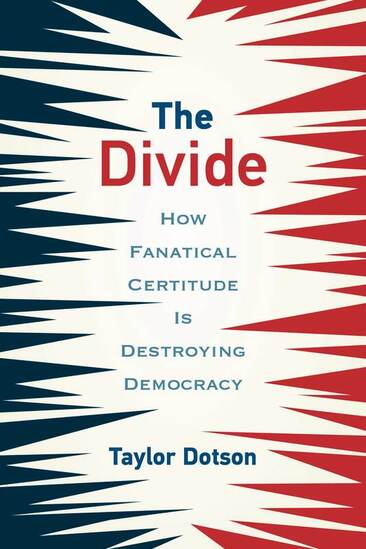|
MIT Press
Penguin Random House Amazon Reviews
|
The Divide
August 2021
Why our obsession with truth—the idea that some undeniable truth will make politics unnecessary—is driving our political polarization. Endorsements
|
Book Excerpt - "Why Science Can't Settle Political Disputes"
Science can be a powerful political tool. Consider a hearing on climate change, “Data or Dogma,” held in 2015 by the then chairman of the U.S. Senate’s Space, Science, and Competitiveness Subcommittee and soon-to-be presidential candidate Ted Cruz. Senator Cruz characterized himself in his introduction as a defender of the truth writ large. As the son of two mathematicians and scientists — both of his parents earned bachelor’s degrees in mathematics — he claimed that he was interested only in ensuring that public policy followed from “the actual science and the actual data.” In Cruz’s view, however, the actual data demonstrated that there was little to no threat from global climate change, contrary to the “alarmism” of mainstream climate scientists.
The notable feature of Cruz’s rhetoric during his hearing was not simply his appeal to scientific evidence but the underlying narrative of science being threatened by politics. Cruz ironically framed his argument in much the same way that his political opponents do: extolling the benefits of open scientific debate and expressing the desire to move past the kinds of partisanship that can cloud a supposedly clear-eyed view of the facts. Yet in Cruz’s view mainstream climate scientists, not skeptics, were the ones guilty of stifling criticism and being overly wedded to a convenient political narrative. He depicted the political problem of anthropogenic climate change as one that can be overcome — fortuitously in the policy direction he prefers — if people were finally to know about the real data: the “inconvenient” facts he presented in his hearing.
It would be much too easy to dismiss speeches like Cruz’s as nonsense, as examples of petty political theater that would not persuade a reasonable person. Yet such talk clearly resonates with some members of the public. In some corners of the internet, mainstream climate scientists are frequently portrayed as both politically biased and scientifically incompetent — “scamsters” using “pseudoscience” and science that “is not yet settled” to force unsound policy on the rest of the country. Such language is nearly the same as that used to describe climate “denialists.” It often seems as if each side of any contentious issue is absolutely convinced of being on the “right side” of science.
But what happens to politics when citizens begin to believe that science should settle public disagreements and when rhetorical appeals to “the facts” start to dominate people’s justifications of their political worldviews and actions? Can science actually play the role in solving contentious disputes that people expect it to?
Continued at The MIT Press Reader
The notable feature of Cruz’s rhetoric during his hearing was not simply his appeal to scientific evidence but the underlying narrative of science being threatened by politics. Cruz ironically framed his argument in much the same way that his political opponents do: extolling the benefits of open scientific debate and expressing the desire to move past the kinds of partisanship that can cloud a supposedly clear-eyed view of the facts. Yet in Cruz’s view mainstream climate scientists, not skeptics, were the ones guilty of stifling criticism and being overly wedded to a convenient political narrative. He depicted the political problem of anthropogenic climate change as one that can be overcome — fortuitously in the policy direction he prefers — if people were finally to know about the real data: the “inconvenient” facts he presented in his hearing.
It would be much too easy to dismiss speeches like Cruz’s as nonsense, as examples of petty political theater that would not persuade a reasonable person. Yet such talk clearly resonates with some members of the public. In some corners of the internet, mainstream climate scientists are frequently portrayed as both politically biased and scientifically incompetent — “scamsters” using “pseudoscience” and science that “is not yet settled” to force unsound policy on the rest of the country. Such language is nearly the same as that used to describe climate “denialists.” It often seems as if each side of any contentious issue is absolutely convinced of being on the “right side” of science.
But what happens to politics when citizens begin to believe that science should settle public disagreements and when rhetorical appeals to “the facts” start to dominate people’s justifications of their political worldviews and actions? Can science actually play the role in solving contentious disputes that people expect it to?
Continued at The MIT Press Reader
